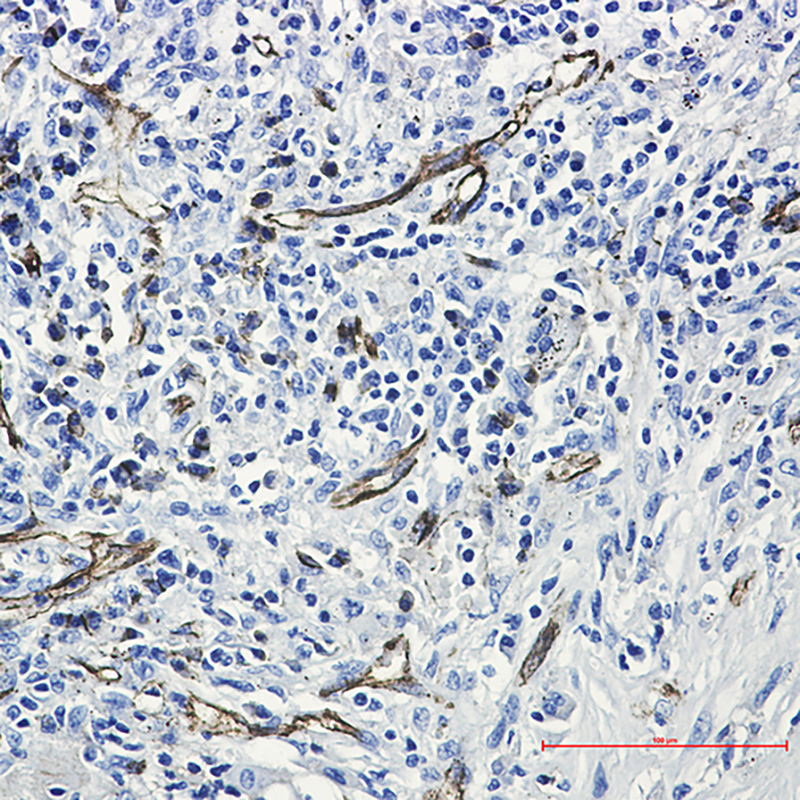

| WB | 咨询技术 | Human,Mouse,Rat |
| IF | 咨询技术 | Human,Mouse,Rat |
| IHC | 1/50-1/100 | Human,Mouse,Rat |
| ICC | 技术咨询 | Human,Mouse,Rat |
| FCM | 咨询技术 | Human,Mouse,Rat |
| Elisa | 咨询技术 | Human,Mouse,Rat |
| Aliases | Platelet endothelial cell adhesion molecule; PECAM-1; EndoCAM; GPIIA'; PECA1; CD antigen CD31 |
| Entrez GeneID | 5175 |
| WB Predicted band size | Calculated MW: 83 kDa; Observed MW: 130 kDa |
| Host/Isotype | Rabbit IgG |
| Antibody Type | Primary antibody |
| Storage | Store at 4°C short term. Aliquot and store at -20°C long term. Avoid freeze/thaw cycles. |
| Species Reactivity | Human |
| Immunogen | A synthetic peptide of human CD31 |
| Formulation | Purified antibody in TBS with 0.05% sodium azide,0.05%BSA and 50% glycerol. |
+ +
以下是3-4条关于CD31抗体的参考文献及其简要摘要:
1. **文献名称**: "Platelet endothelial cell adhesion molecule-1 (PECAM-1/CD31): a multifunctional vascular cell adhesion molecule"
**作者**: Newman PJ, et al.
**摘要**: 该综述总结了CD31(PECAM-1)在血管内皮细胞间黏附、白细胞迁移和血管生成中的作用,强调其作为内皮细胞标志物的重要性及在炎症和免疫反应中的功能。
2. **文献名称**: "CD31 immunohistochemistry in the evaluation of vascular tumors"
**作者**: Parums DV, et al.
**摘要**: 研究验证了CD31抗体在免疫组化中的应用,证明其相比其他内皮标记物(如CD34)具有更高的特异性,尤其适用于诊断血管源性肿瘤。
3. **文献名称**: "CD31 expression in tumor-associated vasculature: a potential therapeutic target"
**作者**: Debnath S, et al.
**摘要**: 探讨了CD31在肿瘤新生血管中的高表达及其与癌症预后的关系,提出针对CD31的抗体可能通过抑制血管生成发挥抗肿瘤作用。
4. **文献名称**: "Mechanisms of PECAM-1-mediated cell signaling in endothelial cells"
**作者**: Müller WA, et al.
**摘要**: 揭示了CD31(PECAM-1)通过调控细胞间信号传导参与内皮细胞迁移和血管修复的分子机制,为治疗血管疾病提供了新思路。
以上文献覆盖了CD31的功能研究、诊断应用及临床潜在价值。如需具体期刊或年份信息,可进一步补充。
CD31 antibody targets the CD31 antigen, also known as platelet endothelial cell adhesion molecule-1 (PECAM-1), a transmembrane glycoprotein predominantly expressed on vascular endothelial cells, platelets, and certain leukocytes. Discovered in the 1980s, CD31 plays critical roles in cell adhesion, angiogenesis, and inflammatory responses. Structurally, it contains six extracellular immunoglobulin-like domains, a transmembrane region, and a cytoplasmic tail with tyrosine phosphorylation sites. Its homophilic and heterophilic binding capabilities mediate endothelial cell-cell interactions, leukocyte transmigration, and vascular permeability regulation.
CD31 antibodies are widely used in research and diagnostics to identify endothelial cells, assess vascular density, and study pathological processes like tumor angiogenesis, atherosclerosis, and inflammatory diseases. In immunohistochemistry, CD31 antibodies serve as reliable markers for vascular endothelial tumors, aiding in differential diagnosis (e.g., distinguishing hemangiomas from other malignancies). Flow cytometry applications include characterizing endothelial progenitor cells or activated platelets. Recent therapeutic explorations target CD31 in modulating immune responses or enhancing drug delivery to endothelial sites. However, interpretation requires caution, as CD31 expression may vary in activated endothelium or neoplastic conditions. Commercial CD31 antibodies are typically monoclonal (e.g., clones JC/70A) raised against human or murine extracellular domains, validated for specific applications across species.
×